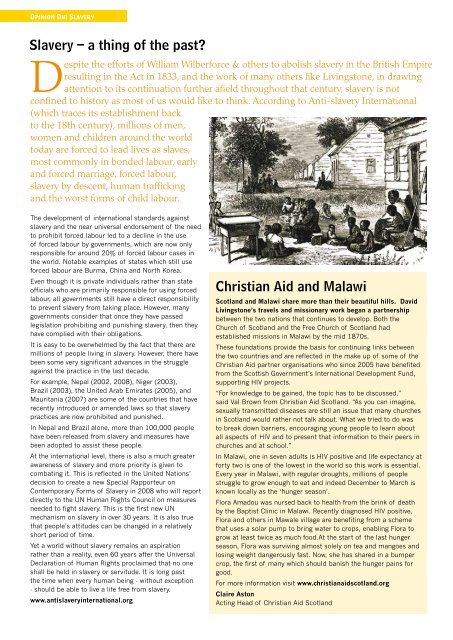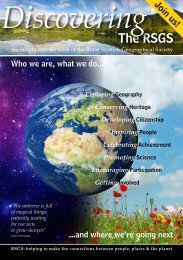Summer - Royal Scottish Geographical Society
Summer - Royal Scottish Geographical Society
Summer - Royal Scottish Geographical Society
You also want an ePaper? Increase the reach of your titles
YUMPU automatically turns print PDFs into web optimized ePapers that Google loves.
Opinion On: Slavery<br />
Slavery – a thing of the past?<br />
Despite the efforts of William Wilberforce & others to abolish slavery in the British Empire<br />
resulting in the Act in 1833, and the work of many others like Livingstone, in drawing<br />
attention to its continuation further afield throughout that century, slavery is not<br />
confined to history as most of us would like to think. According to Anti-slavery International<br />
(which traces its establishment back<br />
to the 18th century), millions of men,<br />
women and children around the world<br />
today are forced to lead lives as slaves,<br />
most commonly in bonded labour, early<br />
and forced marriage, forced labour,<br />
slavery by descent, human trafficking<br />
and the worst forms of child labour.<br />
The development of international standards against<br />
slavery and the near universal endorsement of the need<br />
to prohibit forced labour led to a decline in the use<br />
of forced labour by governments, which are now only<br />
responsible for around 20% of forced labour cases in<br />
the world. Notable examples of states which still use<br />
forced labour are Burma, China and North Korea.<br />
Even though it is private individuals rather than state<br />
officials who are primarily responsible for using forced<br />
labour, all governments still have a direct responsibility<br />
to prevent slavery from taking place. However, many<br />
governments consider that once they have passed<br />
legislation prohibiting and punishing slavery, then they<br />
have complied with their obligations.<br />
It is easy to be overwhelmed by the fact that there are<br />
millions of people living in slavery. However, there have<br />
been some very significant advances in the struggle<br />
against the practice in the last decade.<br />
For example, Nepal (2002, 2008), Niger (2003),<br />
Brazil (2003), the United Arab Emirates (2005), and<br />
Mauritania (2007) are some of the countries that have<br />
recently introduced or amended laws so that slavery<br />
practices are now prohibited and punished.<br />
In Nepal and Brazil alone, more than 100,000 people<br />
have been released from slavery and measures have<br />
been adopted to assist these people.<br />
At the international level, there is also a much greater<br />
awareness of slavery and more priority is given to<br />
combating it. This is reflected in the United Nations’<br />
decision to create a new Special Rapporteur on<br />
Contemporary Forms of Slavery in 2008 who will report<br />
directly to the UN Human Rights Council on measures<br />
needed to fight slavery. This is the first new UN<br />
mechanism on slavery in over 30 years. It is also true<br />
that people’s attitudes can be changed in a relatively<br />
short period of time.<br />
Yet a world without slavery remains an aspiration<br />
rather than a reality, even 60 years after the Universal<br />
Declaration of Human Rights proclaimed that no one<br />
shall be held in slavery or servitude. It is long past<br />
the time when every human being - without exception<br />
- should be able to live a life free from slavery.<br />
www.antislaveryinternational.org<br />
Christian Aid and Malawi<br />
Scotland and Malawi share more than their beautiful hills. David<br />
Livingstone’s travels and missionary work began a partnership<br />
between the two nations that continues to develop. Both the<br />
Church of Scotland and the Free Church of Scotland had<br />
established missions in Malawi by the mid 1870s.<br />
These foundations provide the basis for continuing links between<br />
the two countries and are reflected in the make up of some of the<br />
Christian Aid partner organisations who since 2005 have benefited<br />
from the <strong>Scottish</strong> Government’s International Development Fund,<br />
supporting HIV projects.<br />
“For knowledge to be gained, the topic has to be discussed,”<br />
said Val Brown from Christian Aid Scotland. “As you can imagine,<br />
sexually transmitted diseases are still an issue that many churches<br />
in Scotland would rather not talk about. What we tried to do was<br />
to break down barriers, encouraging young people to learn about<br />
all aspects of HIV and to present that information to their peers in<br />
churches and at school.”<br />
In Malawi, one in seven adults is HIV positive and life expectancy at<br />
forty two is one of the lowest in the world so this work is essential.<br />
Every year in Malawi, with regular droughts, millions of people<br />
struggle to grow enough to eat and indeed December to March is<br />
known locally as the ‘hunger season’.<br />
Flora Amadou was nursed back to health from the brink of death<br />
by the Baptist Clinic in Malawi. Recently diagnosed HIV positive,<br />
Flora and others in Mawale village are benefiting from a scheme<br />
that uses a solar pump to bring water to crops, enabling Flora to<br />
grow at least twice as much food.At the start of the last hunger<br />
season, Flora was surviving almost solely on tea and mangoes and<br />
losing weight dangerously fast. Now, she has shared in a bumper<br />
crop, the first of many which should banish the hunger pains for<br />
good.<br />
For more information visit www.christianaidscotland.org<br />
Claire Aston<br />
Acting Head of Christian Aid Scotland








